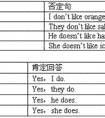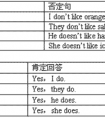用所给单词的正确形式填空。1.Let's __________ (look) insidethewindow.2.MayItake __________ (you) picture?3. I'm __________ (fall)!4.Please __________ (sta-五年级英语
物主代词的用法:
物主代词既有表示所属的作用又有指代作用,例如:
John had cut his finger; apparently there was a broken glass on his desk.
约翰割破了手指,显而易见,他桌子上有个破碎的玻璃杯。
物主代词有形容词性(my, your等)和名词性(mine, yours等)两种,形容词性的物主代词属于限定词。
名词性的物主代词在用法上相当于省略了中心名词的 --'s属格结构,例如:
Jack's cap 意为 The cap is Jack's.
His cap 意为 The cap is his.
名词性物主代词的句法功能:
a. 作主语,例如:
May I use your pen? Yours works better.
我可以用一用你的钢笔吗? 你的比我的好用。
b.作宾语,例如:
I love my motherland as much as you love yours.
我爱我的祖国就像你爱你的祖国一样深。
c.作介词宾语,例如:
You should interpret what I said in my sense of the word, not in yours.
你应当按我所用的词义去解释我说的话,而不能按你自己的意义去解释。
d.作主语补语,例如:
The life I have is yours. It's yours. It's yours. 我的生命属于你,属于你,属于你。
物主代词的意思是物品主人的代词。
| 人称代词 | 第一人称单数 | 第二人称单数 | 第三人称单数 | 第一人称复数 | 第二人称复数 | 第三人称复数 |
| 主格 | I | you | he/she/it | we | you | they |
| 宾格 | me | you | him/her/it | us | you | them |
| 汉语 | 我 | 你 | 他 | 我们 | 你们 |
他/她/它们 |
| 形容词性物主代词 | my | your | his/her/its | our | your | their |
| 名词性物主代词 | mine | yours | his/hers/its | ous | yours | theirs |
| 汉语 | 我的 | 你的 | 他的/她的/它的 | 我们的 | 你们的 | 他/她/它们的 |
考点名称:现在进行时,现在分词
现在进行时:
表示动作发生的时间是“现在”,动作目前的状态是“正在进行中”。所谓“正在进行中”,是指在谈到这件事的时候,这个动作还在进行中。
现在进行时由“系动词am/ is/ are+动词-ing形式”构成。
例:We are reading the text. 我们正在读课文。
My sister is working in a hospital. 我的妹妹在医院工作。
They are watching TV now. 他们正在看电视。
What are you doing, Li Lei? 你现在正在干什么,李雷?- 现在进行时的基本用法:
A表示现在( 指说话人说话时) 正在发生的事情。
例:We are waiting for you.
B. 表示现阶段正在进行的动作,说话时未必正在进行。
例:Mr. Green is writing another novel.
(说话时并未在写,只处于写作的状态。)
例:She is learning piano under Mr. Smith.
C.已经确定或安排好的但不确定会不会发生的将来活动。
I'm leaving for a trek in Nepal next week.(我下周要去尼泊尔旅行)
We're flying to Paris tomorrow.(我们明天乘飞机去巴黎) 一般现在时与现在进行时的区别:
一、准确理解两种时态的主要含义:
(一)一般现在时:
1.表示事物的本质特性或客观存在,没有时限性。
The table ____ soft。(feels) 表特性特征。
Japan ___ in the east of China。 (lives) 表客观事实
2.现阶段经常性、习惯性的行为,可带频率时间。
The shop closes at 7:30 p.m.
Father doesn’t smoke. (习惯)
3.表说话时的状态,感觉或结果,一般用状态动词,如:It doesn’t matter. Does it hurt? (感觉结果)
4.特殊用法:
-在条件、时间、让步从句中用现在时代替将来。
-If you go there,I’ll help you.
—用在begin,come,go,leave,return,open,close 等短暂谓语动词表规定计划。
The plane takes off at 11:30. (不受主观支配的计划)
-在剧本、解说、标题或there(here)开头的句中表进行
There goes the bell/Here comes Mr.Wang.
I declare the meeting opens.(正在宣布)
He meets the ball and hits back to No.2 (正在发生)
(二)现在进行时:
1.说话时正在发生,进行的动作
Look! Dark clouds are gathering . (正在发生)
2.表现阶段正在进行,但此刻不一定正在进行的事。
He usually gets up at 6:00,but this week he is getting up at 7:00. (现阶段正在进行,但说话时不一定在起床)
3.现在进行时的特殊意义
-表示主观打算常用于 go,come,leave,start,begin 等,位移、趋向动词。
How long are you staying here (准备停留)
-表示眼前刚过去的语意即“话音刚落”,适用于tell,say,talk,discuss ….
You don’t believe it You know I’m telling the truth.
-表示安慰、关心、喜欢、讨厌等感情色彩。
He is always making noises in class. (讨厌)
-在条件、时间、让步状语从句中表示将来正在进行。
Don’t bother him if he is reading this time tomorrow.二、严格区分进行时与一般时的语义
1.持续动词的一般时表持续情况,经常性,习惯性行为或客观存在的事实,进行时表暂时性或有限时刻的持续。
2.短暂动词的一般时叙述事实,特征,能力而短暂动作进行时描述反复发生,即将发生或刚开始行为。
3.短暂动词和静态动词一般时表示实际情况客观状态、结果、特征、特性,进行时表未完成含开始或渐进之意。
The bus stops. (车停了-事实)
The bus is stopping. (渐渐停下来)
I love the job. (静态事实)
I am loving the job. ( 渐渐爱上了)
4.come,go,leave,start,return,move,reach,sail,fall 等一般时态表客观规定计划,进行时表主观打算推测。
Flight 254 leaves at 5:30. (表客观规定计划)
The plane is taking off an hour later.(主观判断)
5.现在进行时带always,continually, constantly, for ever等频率副词表感情色彩,一般现在时则没有此用法。现在进行时的构成是:
主语+be+v.ing〔现在分词〕形式
人称
构成形式
第一人称单数
I+am+ing.
第一人称复数
We+are+ing.
第二人称单(复)数
You+are+ing
第三人称单数
He(She,it)+is+ing
第三人称复数
They+are+ing
句式
肯定句
主语+be(is/am/are)+现在分词
否定句
主语+be(is/am/are)+not+现在分词
一般疑问句
(is/am/are)+主语+现在分词
be特殊疑问句
特殊疑问词+相应be动词+主语+现在分词+Sth?
间接引语中改为过去进行时。
现在分词的构成:




![We ____________together. [ ]A. read a bookB. sleep-一年级英语](http://www.00-edu.com/d/file/ks/4/1/60/2019-08-28/smallea4b9832081df346c35e7fe937dd76101566947664.gif)
![What's he doing? He's ___________. [ ]A. readingB. drawing-四年级英语](http://www.00-edu.com/d/file/ks/4/1/60/2019-08-28/small07eb195a0f249b46b2d76d31ab9e28261566947675.jpg)
